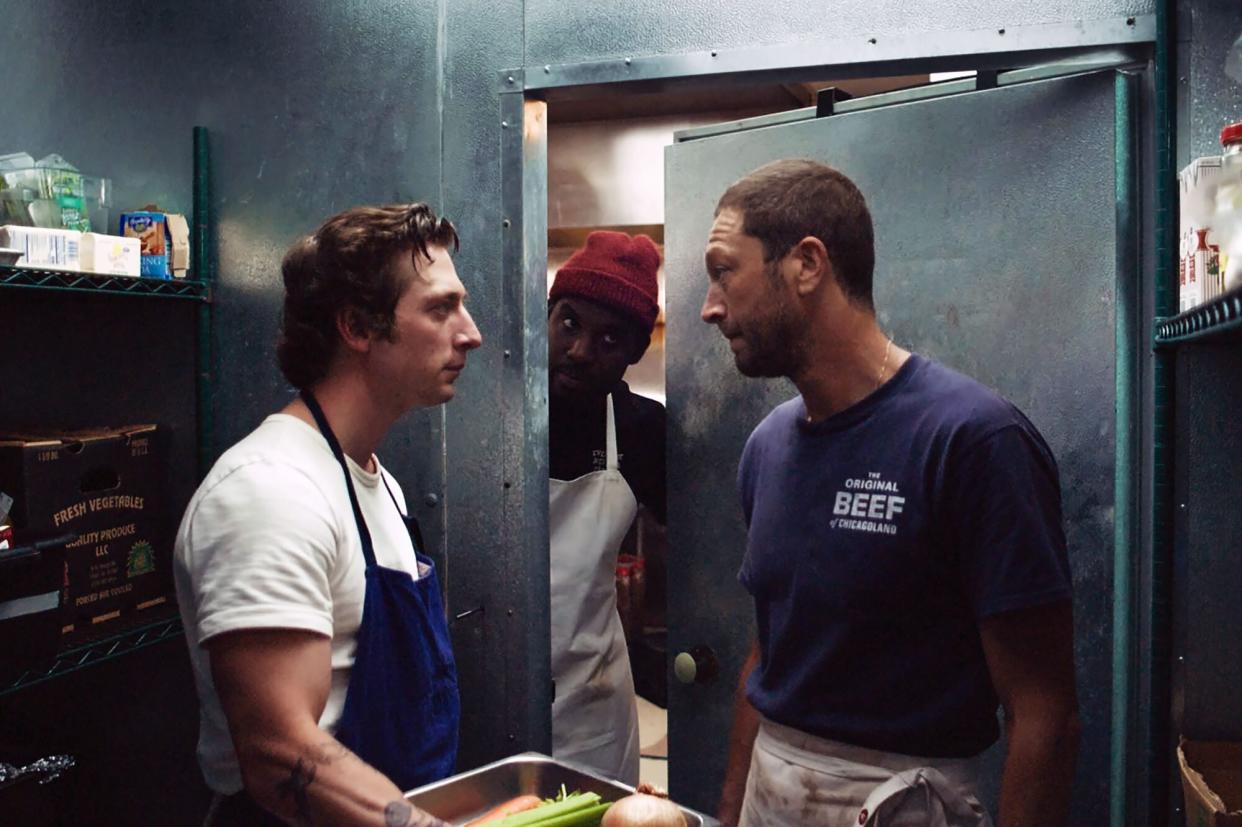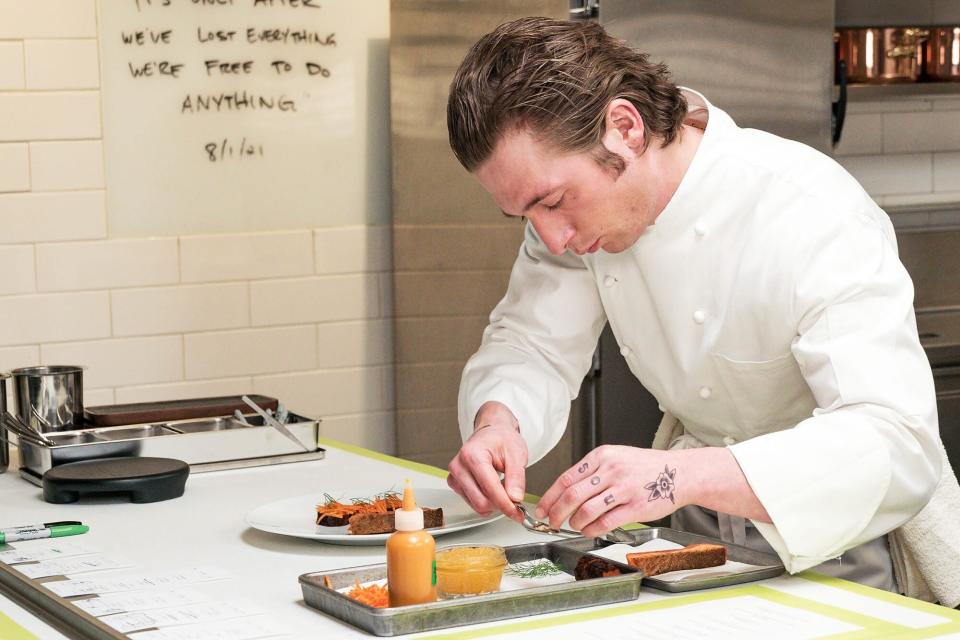What 'The Bear' Gets Right (and Wrong) About Restaurant Work

FX
When I saw FX's The Bear bannered at the top of my Hulu recommendations, I didn't want to click. Aside from The Great British Bake Off, where I can listen to Noel Fielding say the word "cardamom" until I reach hypnosis, I avoid Food TV. I work in kitchens, so that glossy, gilded version of what I do for a job, coupled with media chef-worship, isn't what speaks to me. And yet when I read the description, I begrudgingly submitted. (Warning: Spoilers ahead.)
Not only have I worked in fine-dining kitchens like the ones main character Carmy comes from, but my chef boyfriend and I operated a small pop-up restaurant out of my hometown breakfast diner for part of the pandemic, strikingly similar to the Original Beef of Chicagoland (or, the Beef), the sandwich joint that Carmy inherits from his deceased brother Mikey. "Close to home" felt like an understatement.
The Bear is far from a perfect representation – it's still TV. There are moments of exaggeration and melodrama, somewhat excessive use of industry jargon, and some plot points that frankly don't make sense (like, why does Mikey hide money in tomato cans instead of paying off the deli's debts? And how is the money sealed inside the cans? And what about botulism?).
The business concept of The Beef is also hard to grasp. At first Carmy serves elevated versions of the namesake Beef sandwiches, which inexplicably requires a team of seven. Then new entrées start appearing at the pass, all while pastry chef Marcus spins between chocolate cake, donut experimentation, and a pet project fermentation lab. Clearly, though, the show's creators took care with the details in their depiction of chef life. Jeremy Allen White as Carmy is a realistic casting of that asshole. The moment when Carmy makes himself a PB&J and passes out on his couch with a bag of potato chips after a day of kitchen work, that had my attention. I've been there, and any cook I've known has also been there.
When I think of restaurant work in film and media, I think of Jon Favreau seducing Scarlett Johansson with a bowl of spaghetti in Chef; Meryl Streep giggling with triangles of laminated dough slung over her chest while making chocolate croissants in It's Complicated; Remy in Ratatouille, closing his eyes and seeing flavors like fireworks; Gordon Ramsay screaming "Donkey!" into some cook's ear; and a white man's hand tweezing microgreens set to Vivaldi's Winter. It's celebrity, it's romanticized, it's glorified, and little of it feels real. What I appreciated about The Bear was the messiness: the cracked egg on the floor, the backed-up toilet, wrong deliveries and unpaid vendors, and the audible and visual chaos that comes when a million things are happening all at once in one kitchen.
After watching, an overwhelming sentiment started to surface from myself, my boyfriend, my kitchen friends, and the broader community of cooks who started posting on social media and writing their own opinion articles. We were reliving real-life trauma.

Matt Dinerstein / FX
If you've ever worked with a ticket machine, the repeated sound of the printer relentlessly delivering orders in a rush will haunt your sleep and raise your heartrate. The Bear uses that sound to great effect, in a climactic and chaotic scene when an endless parade of orders floods the restaurant, cooks walk out of the service, and someone gets stabbed with a kitchen knife. I've never witnessed an at-work stabbing but I have worked a service so hectic that cooks grabbed their sneakers and never looked back.
A flashback from Carmy's fine-dining past shows a domineering chef raining down psychological abuses as he plates at the pass: "Why are you so slow? Why are you so fucking slow?" the chef asks without raising his voice. "You should be dead," and the flashback ends. The scene feels like hyperbole, but I've suffered that kind of berating — though I was more used to yelling, not these subdued tones. And when Carmy bares his soul in a monologue, about losing time and touch with loved ones while wrapped up in kitchen work, I thought of all the friends and family who'd slipped without fanfare from my own work-dominated life.
The Bear hits emotional chords, especially at a time when kitchen trauma is a hot topic; some acclaimed restaurants are being torn apart for the way they treat their employees. It almost feels like this kind of restaurant-bashing is the new chef-worshiping, and the media now gets to tear down all the institutions they themselves put on pedestals. But didn't we already know that restaurants were toxic workplaces? Didn't we know about the abusive chef archetype, the ruthless competition, the harrowing hours and conditions? And isn't Carmy just another tormented wunderkind, the genius white male savior, a hero we might be tired of? We're treating The Bear like it's news, but it's not — maybe it's just another kind of TV glamor cast on the abuses that keep on happening in real restaurants everywhere.
There's an amount of human suffering that occurs behind the scenes of any luxurious act of consumption, and fine dining is an extreme example of that sacrifice. Even in the least abusive environments, there's always a line cook sweating to death next to a flat top; there's a porter on their tenth hour of dishwashing; there's a server faking a smile and a chef missing their kid's birthday. In the most abusive, there are scars that go far deeper and last much longer than burns and cuts. How many times do we have to learn about how bad it can be before things start to change?
This isn't to say that fine-dining restaurants should be abolished. I think we need great, ambitious restaurants, if we might be saved from a Seamless drone takeover. But perhaps they can exist in a different way, where equal care is put into the food and the people who prepare and serve it. The Bear suggests that Carmy's going to be a different kind of leader, one who's learned from his own experience and wants to change the narrative instead of perpetuating it. Even with its flaws, I'll watch the second season, to see what kind of restaurant he opens with his windfall of San Marzano cash.
The real success of The Bear is apparent in how many industry professionals are watching and talking about it; even people who have never referred to a sauce as "tight" are hooked. More than the terminology and the name-dropping, the show has captured a feeling: what it feels like when your passion is deeply vested in something so laborious and often fruitless. Carmy is trying to put the pieces back together after the loss of Mikey a bit like many of us, rebuilding our lives in a post-pandemic world. As we all carry on, whether we're working in restaurants or dining out at them, sometimes we need a reminder of our own losses, our own stories of recovery and renewal.

